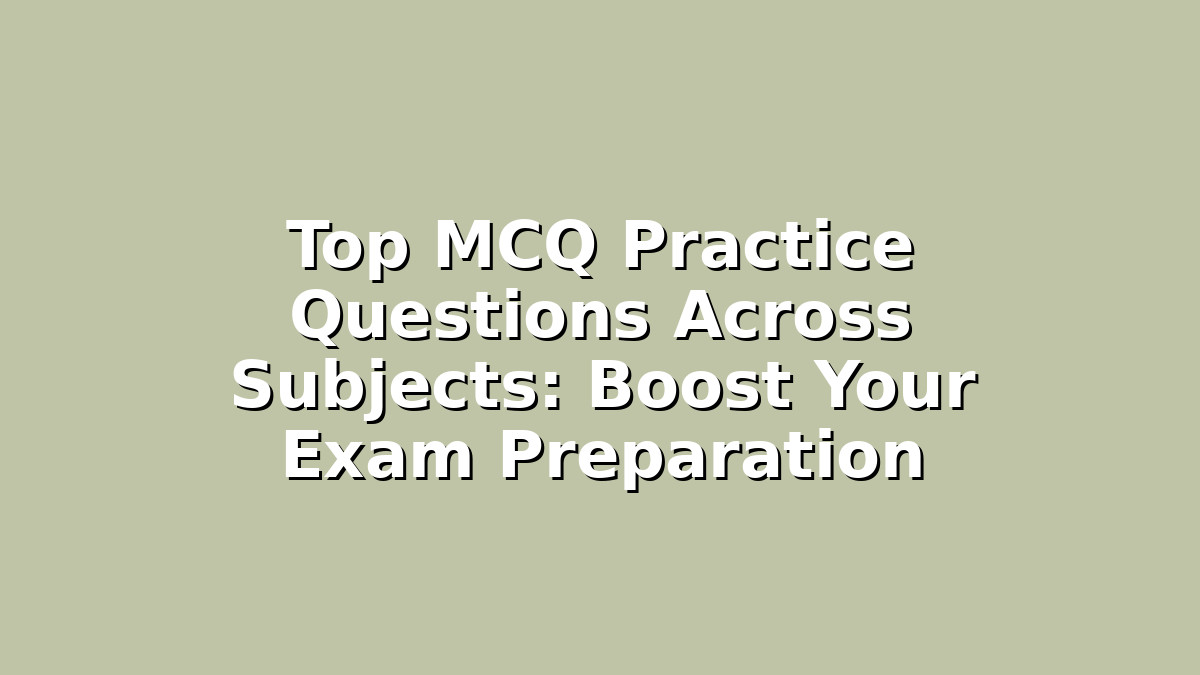Preparing for exams can be overwhelming, especially when you have multiple subjects to cover. One of the most effective ways to enhance your study routine is by practicing Multiple Choice Questions (MCQs). MCQs not only test your knowledge but also improve your time management skills, critical thinking, and exam confidence. Whether you are preparing for school exams, competitive tests, or standardized assessments, incorporating MCQ practice into your study plan can make a significant difference in your performance. In this article, we’ll explore the benefits of MCQ practice and provide you with targeted advice for three major subject areas: Science, Mathematics, and Social Studies.
Why Practice MCQs?
Multiple Choice Questions offer a unique way of learning that differs from traditional essay-type questions. They require you to recall facts, understand concepts, and apply logic quickly. Here’s why MCQ practice is crucial:
– Enhances Recall and Retention: Regular exposure to MCQs helps reinforce what you’ve studied, making it easier to remember important facts during exams.
– Improves Time Management: MCQs are typically timed, helping you develop the ability to answer questions quickly and efficiently.
– Develops Analytical Skills: Many MCQs test your ability to analyze information and distinguish between closely related options.
– Boosts Confidence: Familiarity with question formats reduces exam anxiety.
Now, let’s dive into subject-specific strategies and examples of how to maximize your MCQ practice.
—
1. Science: Mastering Concepts Through Application
Science subjects such as Physics, Chemistry, and Biology rely heavily on understanding key concepts and applying them to various scenarios. When practicing MCQs in science, focus on:
– Conceptual Clarity: Make sure you understand the fundamental principles before attempting questions.
– Diagram Interpretation: Many MCQs include graphs, tables, or diagrams. Practice interpreting these visuals quickly.
– Formula Application: For Physics and Chemistry, ensure you can recall and use formulas accurately.
– Terminology Familiarity: Biology often tests precise terminology, so practice questions that reinforce scientific vocabulary.
Example MCQ Practice Tips for Science:
– Create flashcards with key definitions and formulas.
– Use online quizzes that provide instant feedback.
– Group study sessions can help clarify difficult concepts through peer discussion.
– Practice previous years’ question papers to identify commonly tested topics.
Sample Question:
*In a chemical reaction, the rate increases when the temperature is raised because:*
A) Reactants have more kinetic energy
B) The catalyst is more effective
C) Product concentration decreases
D) The reaction is endothermic
(The correct answer is A, as higher temperature increases molecular movement, speeding up reactions.)
—
2. Mathematics: Sharpening Problem-Solving Skills
Mathematics MCQs often test your computational skills, logical reasoning, and ability to identify patterns. To excel in math MCQs:
– Understand the Basics: Master fundamental operations, formulas, and theorems.
– Practice Mental Math: This reduces the time spent on calculations.
– Break Down Complex Problems: Identify what the question is asking before attempting to solve it.
– Check for Traps: MCQs sometimes include difficult options to test if you’re paying attention to detail.
Example MCQ Practice Tips for Mathematics:
– Solve daily math problems from textbooks and online resources.
– Time yourself to improve calculation speed.
– Work on sample papers with different difficulty levels.
– Use apps or websites offering interactive math quizzes to make practice fun and engaging.
Sample Question:
*What is the value of x if 2x + 5 = 17?*
A) 5
B) 6
C) 7
D) 8
(The correct answer is B, because 2x = 12 and x = 6.)
—
3. Social Studies: Enhancing Memory and Critical Thinking
Social Studies covers history, geography, civics, and economics, requiring both memorization and critical analysis. MCQs in this subject often test your understanding of events, dates, concepts, and their implications.
– Create Timelines: Visualizing historical events helps retain chronological order.
– Use Maps and Charts: Many questions include geographical data; practice interpreting these.
– Understand Cause and Effect: Many questions ask why something happened or what the consequences were.
– Stay Updated: For current affairs or civics, staying informed about recent developments is key.
Example MCQ Practice Tips for Social Studies:
– Summarize chapters into key points and facts.
– Take quizzes that mix factual and application-based questions.
– Discuss topics with classmates or teachers to deepen understanding.
– Watch documentaries or read articles to relate facts to real-world scenarios.
Sample Question:
*Who was the first President of the United States?*
A) George Washington
B) Thomas Jefferson
C) Abraham Lincoln
D) John Adams
(The correct answer is A, George Washington.)
—
Conclusion: Make MCQ Practice an Integral Part of Your Study Routine
Incorporating MCQ practice questions across subjects is a proven strategy to improve your academic performance. The key to success is consistency and a focused approach tailored to each subject’s unique requirements. For science, concentrate on concept application and formula usage. For mathematics, emphasize problem-solving speed and accuracy. In social studies, focus on memorization, analytical skills, and connecting facts to broader contexts.
Remember, practice makes perfect. Use a variety of resources such as textbooks, online quizzes, past exam papers, and study groups. Regularly testing yourself with MCQs builds not just knowledge but also the confidence to tackle any exam with a calm and measured approach.
Stay motivated, keep practicing, and watch your exam scores soar!

Responses